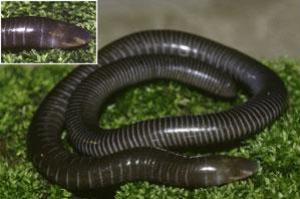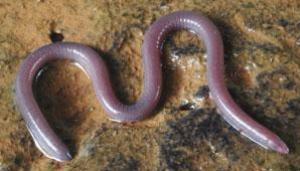Varad Bhagwan Giri
This project aims to improve data on Caecilian populations with a particular focus on systematics.

Gegeneophis danieli, one of the newly discovered species.
Data on the conservation status of caecilians (Order - Gymnophiona) is very poor. A recent review of caecilian conservation biology found that about two thirds of all species are 'data deficient'. The main reasons for incomplete assessments are unstable taxonomy and lack of data on distribution and natural history.

Indotyphlus maharashtraensis, another newly discovered species.
In the last four years five new species of caecilians have been described from northern Karnataka and Maharashtra . All of these are caeciliids, which had been thought to have a low diversity in India , the only place they occur in Asia . These five new species were known from a reported total of <20 specimens, with two species known only from a reported single specimen each. These five new species have all been described from single point localities and from a limited sample of sexes and life history stages. During the recent surveys in Maharashtra more specimens of some these species are collected from different localities.
We know almost nothing of their biology and they are all of data deficient conservation status. On a positive note, most of the new species occur in agricultural or otherwise disturbed, non-forest habitats and have come to light with relatively little field effort. Thus, it should be possible to greatly increase knowledge of these and other, as yet, undiscovered species with further routine fieldwork.
To date, there have been no quantitative studies of caecilian populations over time - these studies are needed before robust conservation assessments can be made. The proposed study will identify sites and species for which future monitoring work can best be undertaken. Although recent preliminary examination of museum collections have identified at least two new caecilian species from Maharashtra, both are currently known from only single specimens with no knowledge of their biology and conservation status. This illustrates the urgent need for more field surveys and a detailed reanalysis of the systematics of the caecilians of the northern Western Ghats . The particular focus of this proposal is systematics because without an adequate systematic foundation, satisfactory considerations of conservation are impossible. We will also develop new keys to help future biodiversity workers identify caecilians of the northern Western Ghats . We will disseminate the data regarding the status of amphibians in the northern Western Ghats to research scientists, national and international conservation NGOs (ISCB, IUCN) and the respective forest officials for conservation planning and action.